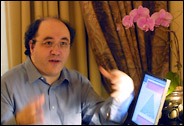 Je m’étais promis de ne pas faire d’article sur Wolfram avant sa sortie mais je craque, il faut que je vous dise la vérité: Wolfram, c’est moi !
Je m’étais promis de ne pas faire d’article sur Wolfram avant sa sortie mais je craque, il faut que je vous dise la vérité: Wolfram, c’est moi !
Plus sérieusement, je viens de recevoir un mail d’un ami avocat qui me pointe un article de 20 minutes sur le sujet. C’est un peu comme le chauffeur de Taxis qui se met à jouer en bourse (désolé Jérém pour la comparaison), c’est un peu n’importe quoi. Ceci dit l’article de 20 minutes est très bien.
Bref, Wolfram est un gros coup de buzz autour d’un produit fermé et relayé par notre ami Spivack, le king du web sémantique, qui comme à son habitude, mobilise les foules autour de ses projets et visions technologiques.
J’ai quand même déjà émis une opinion sur le sujet. En anglais, sorry:
I totally agree when you say that Wolfram is more a DBPedia killer than a Google Killer. Wolfram might be good to retrieve static well-know data such as:
– How old is Barak Obama?
– What is the capital of Venezuela ?
– Where is my car ?
Very useful information. But is it enough to say that Wolfram is a disruptive search engine?I don’t think so. I think that Wolfram is taking the worst approach possible and it nearly makes it dangerous.
Through its one page result list, Google’s algorithm already decides what the web is. What is the right information concerning the few key words you typed. Google already decides what the truth is. Even if you think you have the choice in the 1 million results returned, finally you will never digg into. You will be stuck into the first 3 or 5 results.
So what is Wolfram? Wolfram is a one result Google. Does it sound better? I don’t think so.
How does Wolfram handle the following questions:
– What is the best movie of the week?
– Is Irak war legal?
– What is the best search engine?I’m a semantic web guy. But I truly believe in differences, in various points of views. And I definitely trust my friend’s opinion to decide which film I should watch…
That is why we have launched last week the first community of web editors. Users are organizing their own web, they guide their friends & readers through the web, and they let themselves be guided through the web.
We deeply believe there is no truth concerning any topic. There are just points of views. For instance, here is my french map of the semantic web. It gives 3 ways to discover the semantic web. And as you know there are plenty of ways to describe the SW (through LOD, W3C technologies or even web history).But my point was not to talk about pearltrees. The point is there is no final truth, and giving only one is dangerous.
Bref, je suis pas vraiment emballé…

3 responses so far ↓